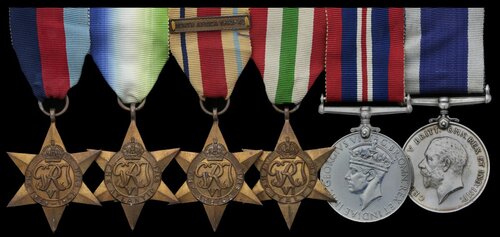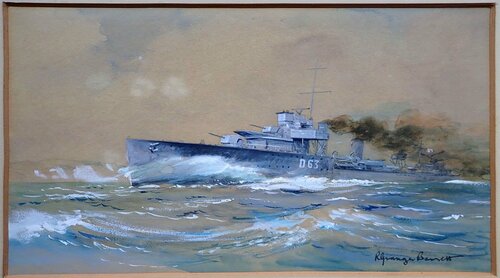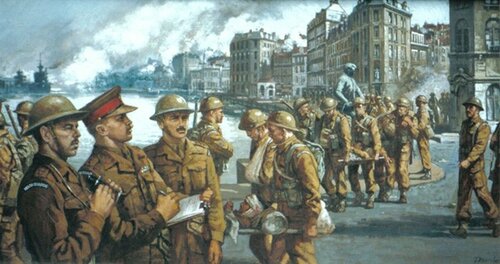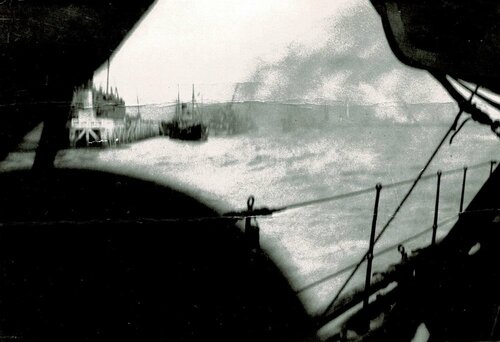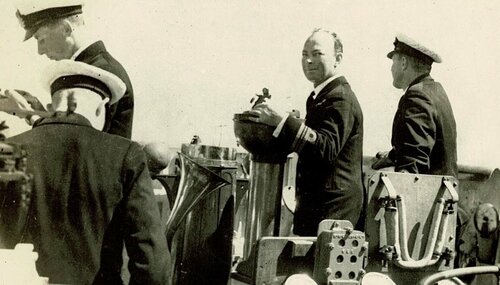Auction: 22001 - Orders, Decorations and Medals
Lot: 288
'30 May 1940
0130
Secured alongside Express at Admiralty Pier, Dover, disembarked troops.
During the embarkation of the B.E.F. troops off Bray the Ship's Company greatly assisted and worked hard in comforting the wounded and feeding the troops. Again on 29 May the men showed determination in repelling the dive-bomb aircraft, and seemed in good fettle on the return journey.
On Thursday 30 May, when Verity had secured alongside in the Submarine Basin, members of the ship's company broke out of the ship, of these three were detained at the Dockyard gate and three returned AM Friday 31st. Six men are still absent. The men who had returned, on being interrogated, stated that their nerves had given way, and they could not "stand it".
Verity was then ordered to stay in Harbour.
It is considered that this situation was caused by lack of rest, and the fact that our "Chummy ships" of the Dover Patrol had been damaged by enemy action causing casualties, and then steadily growing belief that Verity's turn was certain to come. The final effect being the attempt of suicide in the Mess Deck, and later this was increased by one rating developing shell shock … '
The price of protracted service off Holland and France in H.M.S. Verity in May 1940, much of it under a galling fire.
A Second World War campaign group of six awarded to Stoker 1st Class W. J. Booth, Royal Navy, who witnessed extensive action in the destroyer H.M.S. Verity in May 1940
Having lent valuable service off the Dutch coast, where she delivered demolition parties to Flushing and the Hook of Holland, Verity was heavily engaged at the evacuations of Boulogne and Dunkirk
1939-45 Star; Atlantic Star; Africa Star, clasp, North Africa 1942-43; Italy Star; War Medal 1939-45; Royal Navy L.S. & G.C., G.V.R., 3rd issue, coinage head (K. 59040 W. J. Booth, Sto. 1, H.M.S. Lupin), mounted as worn, very fine (6)
William James Booth was born in Epsom, Surrey on 10 January 1902 and entered the Royal Navy as a Stoker 2nd Class in September 1920.
Having been awarded his L.S. & G.C. Medal in 1935, he was serving aboard the destroyer H.M.S. Verity as a Stoker 1st Class on the outbreak of hostilities in September 1939, and he remained likewise employed until December 1940.
Having joined Dover Command in April 1940, Verity - under Lieutenant-Commander Arthur Black, R.N. - first went into action off Holland in the following month, when she embarked a party of Royal Engineers for demolition duties to Flushing on the 10th. Two days later, she embarked a party of Royal Marines for the Hook of Holland, where they undertook like duties prior to the arrival of the Germans.
Boulogne
Verity next played a prominent role at the evacuation of Boulogne on 23 May, where, among other passengers, she embarked General Browning, the Adjutant-General of the B.E.F. The work of Verity - and her consorts - on that occasion is best summarised in the congratulatory message sent by the Vice-Admiral Destroyers, Dover, dated 24 May 1940:
'I wish to express my admiration for the manner in which the Destroyers attached to the Dover Command carried out the difficult operation of evacuating the troops from Boulogne both in the face of heavy air attack and point-blank fire from guns, machine-guns and snipers. The handling of their ships and their armaments and the bearing of the ships' companies was beyond all praise. The following received from the CIGS [Chief of Imperial General Staff] - Army's thanks to your people for last night's magnificent effort at Boulogne.'
The following extract, taken from an article written by Major-General G. L. Verney, D.S.O., M.V.O. - for the Irish Guards Journal in 1957 - serves as a stirring tribute to the fine work carried out by Verity and eight other destroyers in the evacuation of Boulogne:
'There was no finer Naval enterprise during the late war than the evacuation from Boulogne by nine Destroyers, under close-range enemy fire, of the 2nd Battalions of the Irish and Welsh Guards and Headquarters, 20th Guards Brigade after a desperate 48 hours' defence of the port. With German artillery on the high ground less than a mile away, with enemy tanks on the quay on one side of the harbour, mortars, machine-guns and infantry in the houses and snipers on the roofs, the Destroyers came in two at a time - for the basin was too narrow for more - and took on board, first wounded and stragglers from the B.E.F. and Allied refugees, and then as many men of the two battalions as had been able to fight their way back through the town when the order for evacuation arrived.
Guardsmen, with seamen and marines of the demolition parties, fought as units together and held off the Germans for several hours while thousands of men were embarked and taken across the Channel, the task being made harder by numerous intense air attacks during which man bombs fell into the water so close to the ships that it seemed they could not survive. The accurate gunnery of the Navy excited the admiration of all; one enemy tank was sent spinning across the quay; snipers were blown off roofs; in one ship the mounting of a gun was blown away, but the gun was supported on the shoulders of some of its crew and continued firing.'
Fine work indeed.
Dunkirk
On 27 May 1940, Verity departed to Dover as escort to the passenger ships Biarritz and Archangel, the whole bound for Dunkirk via the southern channel route, a course which brought them within range of the guns of German occupied Calais. All three ships came under heavy fire, taking resultant casualties, among them Verity's captain, Lieutenant-Commander Arthur Black, R.N. George Cohen, a Director Sight Setter aboard Verity later recalled how one shell blast blew everyone across the bridge: 'I could see he [Black] had been wounded, blood was filling his small wellingtons, and the Sub. Lieutenant had also been hit. I had to go down aft and get the First Lieutenant.'
Admiral Sir James Somerville paid Verity's crew a visit that evening:
'Heard that there was some trouble in the Verity which had had an exceedingly trying time for the last three weeks in addition to some casualties, including her Captain that morning. I went on board and addressed the men and managed to get them into a fairly cheerful frame of mind. Captain Tennant had been appointed as SNO Dunkirk and had sent a signal over to say that that in view of the bombing of the harbour there most of the evacuation would have to take place from the beaches' (The Somerville Papers, refer; see The Naval Records Society, Vol. 134, 1995).
Command having then devolved to Lieutenant L. E. Jones, R.N., Verity made two more trips to Dunkirk. Of events on 28 May, George Cohen later recalled:
'Then there was Dunkirk, a sight I have never forgotten. As we approached the coastline I thought I could see bushes, but as we got closer, we could see it was soldiers, all moving around. We got as close as we could, and lowered the motor-boat and whaler, and started to ferry Army personnel back to Verity. I had one turn in the whaler towed by the motor-boat. We did about three trips to the beach, returning to Dover each time, and two alongside the jetty at Dunkirk, being bombed by Stukas and machine gunned.'
Having returned to Dover with 315 troops at 0615 hours on the 29th, Verity again sailed for Dunkirk that afternoon. The large gathering of naval and merchant ships on and off the Mole made easy prey for the Luftwaffe, several being heavily damaged with large loss of life, not least one of Verity's destroyer consorts, Grenade. Packed with troops she took a direct hit alongside the Mole at around 1600 hours, the resultant carnage being described as terrible.
For her own part, Verity hit the submerged wreck of a drifter as she made her way out of the embattled harbour, but she managed to get clear and arrived at Dover at 0115 hours on the 30th. She was ordered to remain there, the consequences of her last four weeks under fire now taking their toll on her gallant ship's company. Once again, George Cohen takes up the story:
'I collapsed with exhaustion, crying and shaking, and with two other crew members was sent to Gillingham Hospital, where I was kept in for a fortnight. For two days and nights I could not sleep, just shaking. I was never proud of that, but the Medical Officer said after a month of dive bombing, shelling and hardly any sleep, men were bound to crack. Ten other members of the crew jumped ship, but were caught by a patrol off another ship, put in cells for the night, and sent home the next day on sick leave. When I was fit enough I was sent home for 10 days sick leave.'
For further details of Verity's impressive role in these operations, see:
http://vandwdestroyerassociation.org.uk/HMS_Verity/index.html
Postscript
Booth departed the gallant ship's company of Verity in December 1940 and, by September 1942, he was serving at Ferret, the Londonderry naval base.
He was finally released 'Class A' in November 1945.
Subject to 20% VAT on Buyer’s Premium. For more information please view Terms and Conditions for Buyers.
Sold for
£250
Starting price
£130

